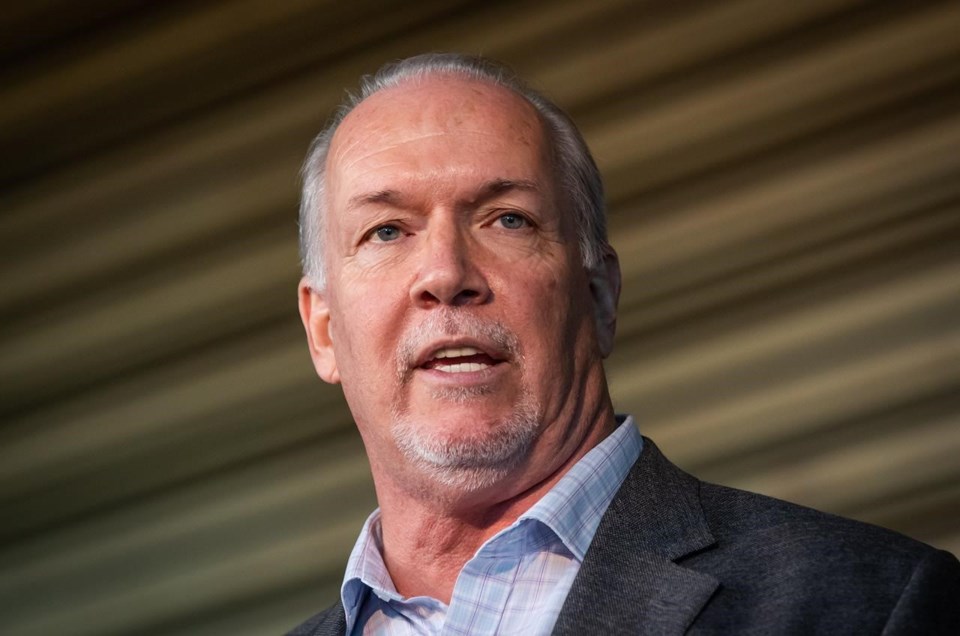VICTORIA — British Columbia has introduced a plan to reach its legislated target to reduce greenhouse gas emissions by 2030 with initiatives like slashing the number of kilometres driven by 25 per cent compared with last year and boosting the carbon tax.
The strategy announced Monday requires that 90 per cent of passenger vehicles sold in 2030 be zero-emission, with all of them required to meet that goal five years later as the province electrifies public transit and ferry fleets.
B.C. also set a target of 10,000 public charging stations for electric vehicles by 2030, while aiming to reduce emissions in existing homes and buildings through new space and water heating equipment. As well, all new buildings would not be allowed to emit new climate pollution to the atmosphere at that point.
The government says the plan will result in B.C. meeting its legislated greenhouse gas target of 40 per cent below 2007 levels by 2030.
The latest strategy would increase the price of carbon pollution by meeting or exceeding the 2019 federal benchmark of $170 per tonne starting in 2023 through taxes consumers would pay on fuel and goods as well as by industry that emits carbon dioxide. On April 1, B.C.'s carbon tax rate rose from $40 to $45 per tonne.
Premier John Horgan said the effects of climate change are clear from this summer's record-setting heat wave, which killed over 800 people in the province, and a wildfire that destroyed the village of Lytton as the temperature rose to nearly 50 C.
"The threat is no longer decades away, it is here with us in everything we do," he said.
"We need to make sure that we're regulating the carbon emissions of our largest polluters," Horgan said. "We need to make sure we're assisting people in making a transition from how they do business today to how we need to do business in the future."
Environment Minister George Heyman, who is set to attend the United Nations climate change conference in Glasgow next week, said the province's newest climate change plan provides initiatives across all sectors of the economy in order to reduce emissions and that a new law means B.C. must annually report its successes and failures.
The plan, which aims to transition B.C. to a clean-energy economy, includes consultation with First Nations as well as a so-called climate solutions council of industry, labour, academics and environmental organizations.
However, some groups have criticized the plan for the province's continuing reliance on fossil fuels, and a failure to address emissions from the oil and gas industry while work continues on the LNG Canada project, a liquefied natural gas facility in Kitimat.
Green Party Leader Sonia Furstenau said the government's commitment to subsidize fossil fuel production will make it harder to build the clean power and infrastructure required to meet its targets.
"Between now and 2030, B.C. will see a marked increase in fracking as a result of the NDP's $6-billion giveaway to LNG Canada," she said in a news release. "The government's support for this industry places a greater burden on the rest of our economy to make up the emissions gap."
Furstenau also questioned the province's target for net-zero emissions by 2050 while other jurisdictions appear to be taking stronger action against climate change.
"California has a plan to achieve net zero by 2045 and Quebec recently banned oil and gas extraction."
Heyman said the province plans to reduce the use of fossil fuels in transportation and buildings and promote the development of clean hydrogen in industry while moving toward 100 per cent electrification, but the transition has to be part of a global movement.
The UN's World Meteorological Organization said Monday that greenhouse gas concentrations hit a record high last year and increased at a faster rate than the annual average for the last decade despite a temporary reduction during pandemic lockdowns.
Mark Jaccard, a member of the province's climate solutions council, which provided input on the plan, said the issue of fossil fuel subsidies is contentious but they are declining.
"They are largest in developing countries where governments subsidize the final price of gasoline and diesel and the subsidies that happened in North America were mostly for new production in oil and gas. But yes, we need governments, including this one, to make sure any subsidies are declining over time. And that will be a good test."
Jaccard, who is also a professor of resource and environmental management at Simon Fraser University, said the government must act quickly to implement the key policies of its new plan and that the price on carbon must keep rising.
— By Camille Bains in Vancouver
This report by The Canadian Press was first published Oct. 25, 2021.
The Canadian Press



